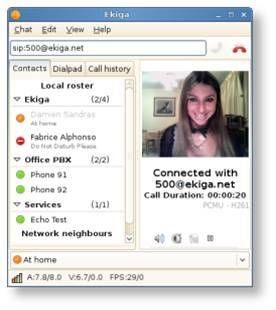VoIP, in other words, Voice over Internet Protocol, is one of the smartest innovations in the field of telecommunication. VoIP not only made the ridiculous telecommunication charges low, it also enabled the connection of many communications channels together. In VoIP, telecommunication is performed through the Interne. Therefore, almost all Internet connected devices could be connected in VoIP. Due to the easiness and the lower cost, even the multibillion dollar enterprises adopt this technology for all local and international communications.
Linux is one rich operating system with a lot of software options for the same purpose. This is no exception when it comes to VoIP clients in Linux. Let’s have a brief look at the best VoIP clients in Linux.
Ekiga
This is the most popular VoIP client for Linux. This client has been around for years now and therefore it has developed to the competitive level where it can compete with the commercial VoIP clients. Due to the popularity and the features, this VoIP client is distributed with many Linux distributions as a default VoIP client. But from recent, some of the Linux distributions have removed Ekiga from their default software list and given the option to the users to choose. Ekiga is the default GNOME VoIP client published by the GNOME team.
Ekiga supports many audio and video codecs and this support exceeds the support provided by many other similar VoIP clients. Unlike many other clients, Ekiga can be connected to other SIP compliant VoIP clients without an issue.
Linphone
Linphone is another successful Linux VoIP client that runs on almost all the Linux distributions of the day. Linphone is usually fancier than Ekiga and consists of an improved user interface when it comes to the usability and eye-candy. Therefore, a lot of new users adopt Linphone as their favorite VoIP client. In addition to being a VoIP client, Linphone also works as a text messenger. The users of Linphone can send text messages to other devices that are compatible with SIP protocol. SIP is an open standard for Internet communications. In addition, the users can use Linphone with any SIP compliant VoIP operator in order to connect to various devices supported by the operator.
Unlike many other VoIP clients on Linux, Linphone is available on some other platforms as well. Linphone is now available for Windows and OSX platforms. Taking another step forward, Linphone offers smart phone clients for phone running Blackberry OS, Android, and iPhone. This way, you can connect with other people using your mobile phone, but just with the expense of the data.
KPhone
KPhone is the VoIP client offered by KDesktop environment. Same as all the other VoIP clients on Linux, KPhone supports SIP protocol for its communications. In addition to the basic features, it also supports many other features. This client was originally developed by a company and they stopped the development by 2005. From then onwards, a group of volunteers maintain the development of the software.
KPhone consists with many features that are user friendly. As an example, it offers multiple parallel sessions, so you can be connected to many people at the same time. But the limitation is that you have to keep everyone else on hold while taking to one person. If you take good commercial alternatives such as Skype, the users can actually have real-time conferences with the video on. In this sense, KPhone offers many features, but they all have many limitations.
In addition to parallel calling, it also offers features such as call forwarding, call transfer, and auto answer facilities. These features are not available in most of the other Linux VoIP clients. Although KPhone is not fancy in terms of user interface, it gets your work done.





